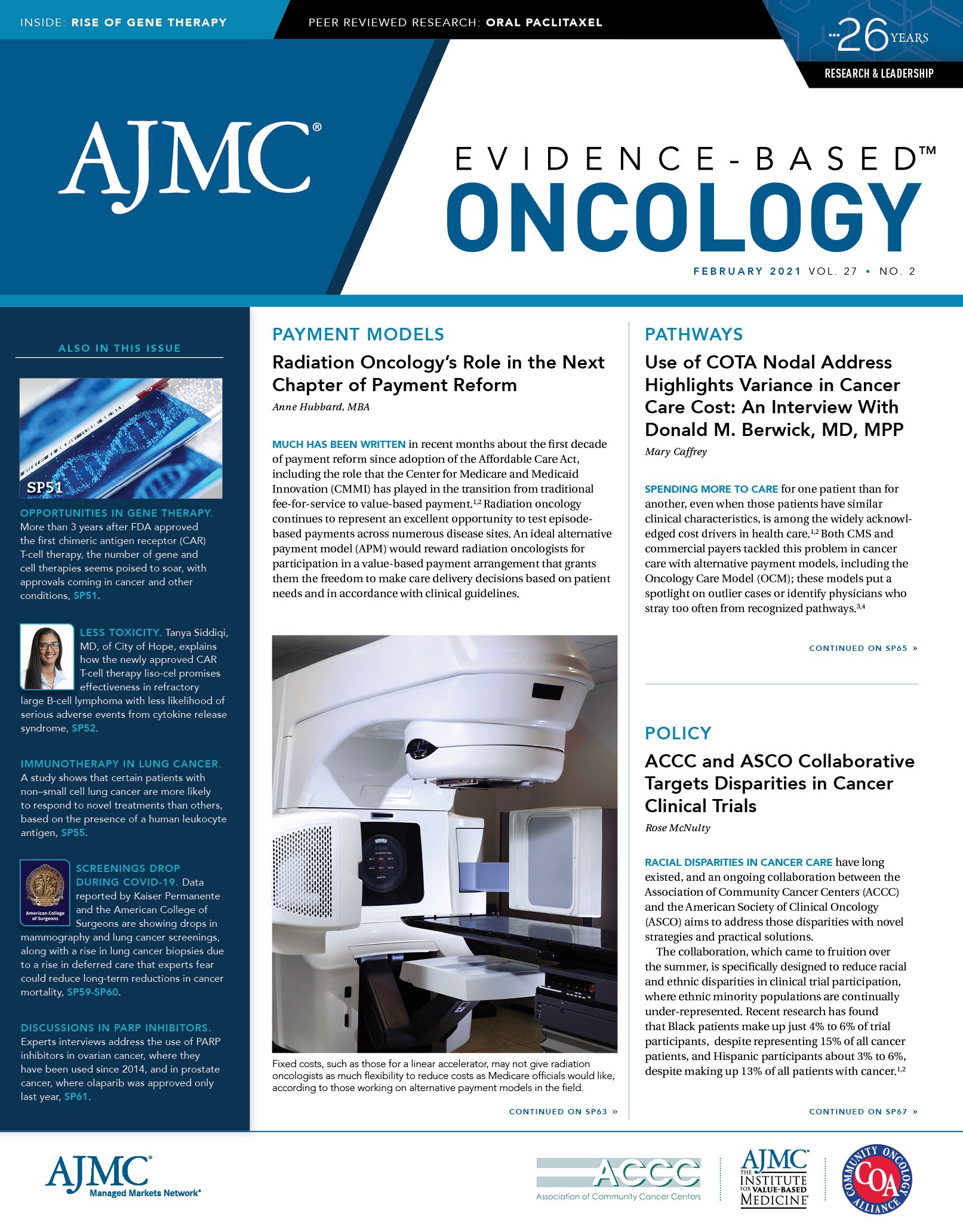- Center on Health Equity & Access
- Clinical
- Health Care Cost
- Health Care Delivery
- Insurance
- Policy
- Technology
- Value-Based Care
FDA Approves Osimertinib for Adjuvant Treatment of Early-Stage EGFR-Mutated NSCLC
The new indication for osimertinib (Tagrisso) marks the first FDA approval of an adjuvant treatment for non–small cell lung cancer (NSCLC) with EGFR exon 19 deletions or exon 21 L858R mutations.
The FDA has approved osimertinib (Tagrisso) for the adjuvant treatment of patients with early-stage non–small cell lung cancer (NSCLC) with epidermal growth factor receptor–mutated (EGFRm) tumors.1 This marks the first FDA approval of an adjuvant treatment for NSCLC with EGFR exon 19 deletions or exon 21 L858R mutations.
The approval was based on results from the phase 3 ADAURA trial, in which osimertinib showed significant improvement in disease-free survival (DFS) in patients with stage II to IIIA NSCLC with EGFRm tumors and in the overall trial population of stage IB to IIIA EGFRm NSCLSC.2 The review was conducted under the FDA Oncology Center of Excellence’s Project Orbis, which allows concurrent submission and review of oncology drugs among international partners.
In the double-blind, phase 3 trial, patients with resected EGFRm NSCLC (n = 682) were randomized to receive either 80 mg of osimertinib (n = 339) orally once daily or a placebo (n = 343) after recovery from surgery with or without standard adjuvant chemotherapy for 3 years. The primary end point was DFS in stage I to IIIA disease, and secondary end points included DFS in the overall population, overall survival, and safety.
Adjuvant osimertinib reduced the risk of disease or death in patients with stage II to IIIA disease by 83% (HR, 0.17; 99.06% CI, 0.11-0.26; P < .001) compared with the placebo group. At 24 months, 90% of the osimertinib cohort was alive and disease-free (95% CI, 84%-93%), compared with 44% of the placebo group.
Overall, 89% (95% CI, 85%-92%) of the participants in the study who received osimertinib and 52% (95% CI, 46%-58%) of patients in the placebo group were alive and disease-free at 24 months. The overall HR for disease recurrence or death was 0.20 for patients receiving osimertinib (99.12% CI, 0.14-0.30; P < .001).
“EGFR inhibitors in the advanced setting slow disease recurrence and provide palliation. But there’s always resistance that’s going to develop. But by using them earlier on, the hope is that we’re able to really cure patients. We get to disease when it’s at a much lower disease burden and fewer resistant cells,” ADAURA investigator Roy S. Herbst, MD, PhD, chief of medical oncology at Yale Cancer Center and Smilow Cancer Hospital, told The American Journal of Managed Care® in an interview.
The ability to utilize osimertinib in the earliest stages of disease is practice-changing, Herbst said. He stressed the importance of testing for mutations early on in treatment and said his clinic at Yale will start screening patients and genomic profiling at the time of surgery to identify those who are eligible for adjuvant osimertinib.
Osimertinib has been approved as a first-line therapy for untreated metastatic NSCLS with EGFR exon 19 deletions or exon 21 L858R mutations since 2018,3 but this latest indication represents a patient population with a need for treatment options. An estimated 76% of lung cancer cases are NSCLC, and approximately 20% of those patients with have EGFRm NSCLC. In this population, about 30% have resectable disease and would be eligible for treatment with osimertinib in the adjuvant setting.
“We’re still waiting for survival [data] on this trial, but we’ve shown amazing disease-free survival benefits—83% improvement. And we’ve also shown fewer metastases to vital organs such as the brain,” Herbst said. “I think having this option now for patients is just so wonderful, especially a couple of months earlier than expected, and I think it’s going to take off very quickly. It was already being used, but of course it’s important to have the FDA approval for reimbursement, especially.”
References
1. FDA approves first adjuvant therapy for most common type of lung cancer. News release. FDA; December 18, 2020. Accessed December 22, 2020. https://www.fda.gov/news-events/press-announcements/fda-approves-first-adjuvant-therapy-most-common-type-lung-cancer
2. He J, Tsuboi M, Wu Y, et al. Osimertinib in resected EGFR-mutated non–small-cell lung cancer. N Engl J Med. 2020;383(18):1711-1723. doi:10.1056/NEJMoa2027071
3. FDA approves osimertinib for first-line treatment of metastatic NSCLC with most common EGFR mutations. FDA. Updated April 19, 2018. Accessed December 22, 2020. https://www.fda.gov/drugs/resources-information-approved-drugs/fda-approves-osimertinib-first-line-treatment-metastatic-nsclc-most-common-egfr-mutations

Insufficient Data, Disparities Plague Lung Cancer Risk Factor Documentation
September 24th 2023On this episode of Managed Care Cast, we speak with the senior author of a study published in the September 2023 issue of The American Journal of Managed Care® on the importance of adequate and effective lung cancer risk factor documentation to determine a patient's eligibility for screening.
Listen
